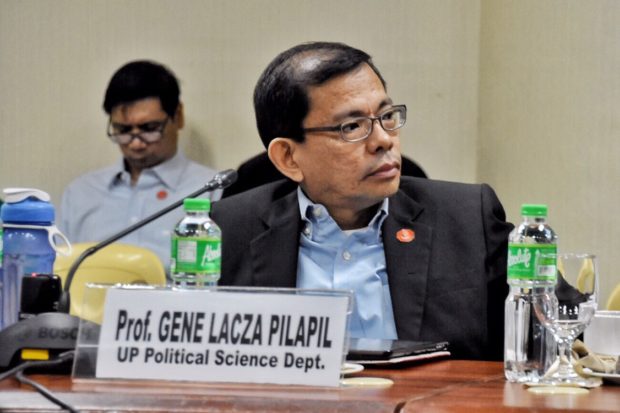A university professor on Tuesday challenged proponents of federalism in Congress to bar President Duterte from running for President in the Federal Republic of the Philippines that they envisioned.
“Ban Duterte, defend democracy,” University of the Philippines assistant professor of political science Gene Lacza Pilapil said at a hearing called by the Senate committees on constitutional amendments and revision of codes and electoral reforms and people’s participation.
Pilapil addressed his challenge to President Duterte’s PDP-Laban, members of the House of Representatives and the consultative committee on constitutional amendments during the eighth joint hearing on proposals to amend the 1987 Constitution.
Presidential script
“[W]rite down a provision banning the incumbent President to allay the valid fears of many Filipinos that this shift [to] federalism is part of the same script of the current President and his key allies to remain in power beyond his constitutionally mandated term limit under the 1987 Constitution,” Pilapil said.
He likened the statement of President Duterte that he would step down in 2022 even if a federal Constitution was passed to the campaign promise he made in 2016 that he would ride a Jet Ski to the Spratlys to assert Philippine sovereignty over some islands there that he later said was just a joke.
Mr. Duterte has repeatedly said that he will step down when his term ends in 2022 and that he is even willing to cut his term short if a federal Constitution is adopted earlier than the end of his term.
But Pilapil wants the proponents of federalism to ensure Mr. Duterte will be nowhere in a federal state.
“To make sure that in 2022 he does not tease the country for believing him in 2018 that he will step down once his term ends under the 1987 Constitution and not run again for President, institutionalize his promise to step down by constitutionally barring him to run in your proposed federal Constitution,” Pilapil told the lawmakers.
Pilapil was responding to the question whether incumbent elective officials with expiring terms should be allowed to run in the 2018 midterm elections as if they were running for their first terms.
‘Suave grab for power’
He described these officials’ bid to run anew as a “suave power grab” and said this was even more dangerous than the no-election scenario being floated by administration allies because in 2022 it would involve Mr. Duterte.
Pilapil cited elected leaders who tried to skirt term limits by rewriting their countries’ Constitutions, including Alberto Fujimori of Peru, Hugo Chavez of Venezuela and Ferdinand Marcos of the Philippines.
He said Marcos tried to write a new Constitution in 1971-1972 to override the two consecutive terms prescribed in the 1935 Charter. Failing, he said, Marcos declared martial law in 1972 to stay in power.
“Changing constitutions is a classic strategy of autocratic leaders elected in democracies but who later undermined their democracies,” Pilapil said.
Worries that Mr. Duterte would still be the leader in a new federal government sprung from the “mind-boggling powers” that he would have under the transitory provisions of House Concurrent Resolution No. 9 and House Resolution No. 8 by Representatives Eugene de Vera and Aurelio Gonzales Jr., according to Pilapil.
The President would be a “one-man hyperexecutive-legislative package” and his powers would be “almost revolutionary,” he said, noting that the transitory provisions would have Mr. Duterte exercise powers of a head of state and head of government until the election of a new President and a Prime Minister in 2022.
“With all these immense powers and since the new Constitution does not bar him [from running], he would … be in a perfect position to run in 2022, [with] an unbelievable head start [over] any opposition in the next presidential elections,” he said.
